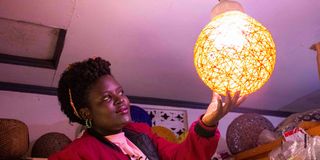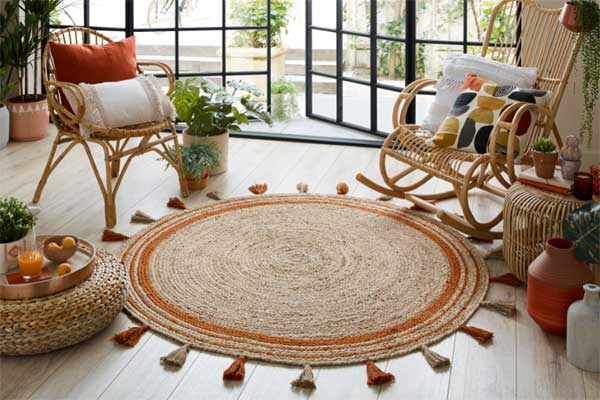Prime
A unique passion in yarn décor

Carol Twambazemungu displays one of the lampshades on sale in her workshop. PHOTOs/Isaac Kasamani.
What you need to know:
All it took for Carol Twambazemungu to leave her job were some eye catching décor trends. She now runs a thriving business.
With a skein of yarn and some simple tools, Carol Twambazemungu has created a business and great décor for homes and working spaces. Twambazemungu’s décor products range from simple recycled bottles to innovative wall art and lampshades.
Twambazemungu’s journey started in 2018 after graduating from university, during her first job. All it took for Twambazemungu to leave her job were some eye catching décor trends.
Twambazemungu, who had always been creative and loved working with her hands, started off her ntrepreneurial journey by making carpets that she would sell to friends and family. This helped her build a solid and loyal clientele base.
Starting out
Twambazemungu notes that although she had learnt how to make carpets at school n her Home Economics classes, she picked interest in crafting from her mother who is an expert at crocheting.
“My interest in crafting began at an early age, and one of my fondest childhood memories is of my mother busy crocheting at home,” she says.
Mastering the skill
Although Twambazemungu had the passion and skill, she realised that to monetise her venture, she needed to become the best at her chosen trade. So in 2018, she enrolled for a course on how to work with yarn.
She was introduced to novel methods of crafting and how to create different products.
“I learnt how to use tapestry and mat mesh which were less physically demanding and less time consuming. This meant I could create diverse products, produce in bigger numbers in a short period,” she says.
Growing business
With her newly acquired skills, in addition to making crafts, Twambazemungu started training other people in 2019. The training provided another source of income that she would invest in her decor business. That same year, a customer paid Twambazemungu to train a group in DR. Congo.
“It is from this deal that I got enough money to buy more materials and rent a more spacious working space,” she says.
Breaking even
Twambazemungu says the Covid-19 lockdown was a blessing in disguise because it was a peak season for the business.
“I had more business opportunities from training to selling my products since many people were home and wanted to occupy their time with something productive,” she says.
Products
Having started with carpets, Twambazemungu went on to learn how to make other products including lampshades, adorned mirrors, decorative bottles and faux flowers.
“I quickly realised that I heard to diversify my business if I wanted to make money because all of a sudden everyone was making carpets and soon the market would be saturated,” Twambazemungu says.
The creative describes herself as an observer who always pays attention to décor trends to be able to create something unique and relevant to the market.
“For inspiration I go online which is a treasure trove of great ideas. I also visit different showrooms to see what is on display and figure out how to make something similar or better,” she says.
She says if she had to pick one product that made a great difference for her business it would be the mirrors.
“The mirrors boosted our business so much since they were unique and had so much demand,” she says.
Cost
A set of four bottles costs between Shs80,000 and Shs100,000 depending on the size and materials used. She also charges differently for custom orders depending on the size, type and quanity of the products.
Raw materials
Twambazemungu sources most of her raw materials from England, Kenya and China. For some products she uses Robin Yarn which is made in Uganda.
Advice
She stresses that one’s passion can and should be turned into a source of income.
“This way you get to share your passion with more people and it gives you a sense of fulfillment. Also some old-fashioned skills such as crocheting might not seem exciting but, they can provide one with a stable source of livelihood,” she notes.
She also cautions entrepreneurs against complacency.
“Do not get comfortable with where you are, keep your mind open to change and keep innovating different services and products to take your business further,” Twambazemungu advises.
Currently, Twambazemungu sells yarn, patterns and kits, craft supplies, clothing, home and office decor, jewelry, purses and accessories.
Cost
A set of four bottles costs between Shs80,000 and Shs100,000 depending on the size and materials used. She also charges differently for custom orders depending on the size, type and quantity of the products.




